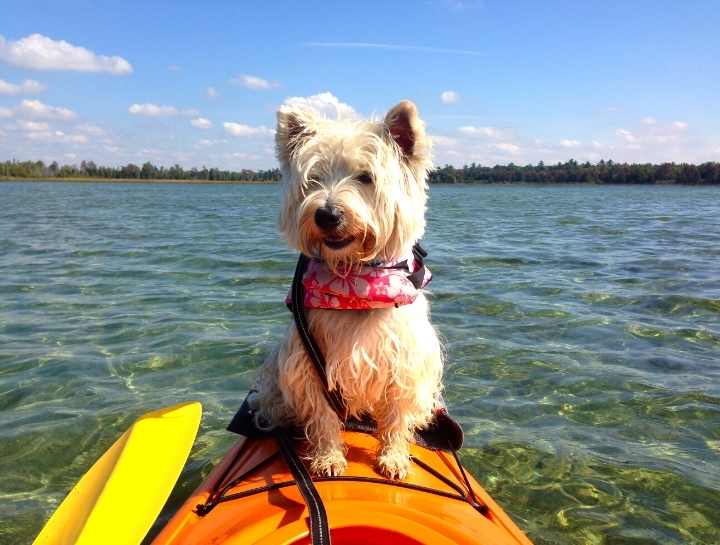Summer Safety Tips for Pets

Summer months are a wonderful time of year for enjoying barbeques, swimming, relaxing with friends and enjoying the great outdoors. But it can also be a dangerous time for our beloved pets if we aren't careful.
Below are four concerns for our pets during these warm, lazy summer days:
1) Heat Stroke
Most people are aware of the dangers of leaving your pets in a closed car on a warm day. Even in fairly mild temperatures (60-70 degrees) a car can heat up to 10-20 degrees in the first 10 minutes, leaving our pets in danger. In 80 to 90 degree temperatures, the interior of a car can reach up to and over 100 degrees within 10 minutes. Cracking the windows for “ventilation” does not help keep the temperature down
The majority of heat stroke cases that we see, however, are not from dogs in cars, but from dogs out for walks. Most dogs will not intuitively rest or stop when their core body temperature is rising but will press on with the walk. Therefore, it is important on hot days to walk your dogs in the early morning or late evening when the temperatures are cooler.
Signs of heat stroke are:
- Heavy Panting
- Bright Red Tongue and/or Gums
- Heavy salivating with thick saliva
- Weakness/Stumbling
- Vomiting
- Collapse
If you see these signs and fear your dog is suffering from heat stroke, seek immediate veterinary care. If possible, try to slowly lower your pet’s temperature with cool compresses. Do not apply cold water as this can lower the temperature too quickly and brain swelling can occur. If your pets core temperature reaches 106 or above, it can cause permanent damage and ultimately can be fatal. Go to your nearest veterinarian so that they can properly treat your pet with iv fluids and a slow cooling process.
2) Insects and Other Creatures
Ticks and fleas are a common problem and should be on preventatives all year long as discussed in a previous blog. However, there are other insects that can be dangerous to pets. Bees, spiders, ants and other bugs can bite and sting your pet causing swelling at the site. Often, there is swelling of the snout and head as our curious pets are bitten on the face as they are inspecting their environment. If your pet’s snout or face suddenly swells, you should seek veterinary attention. If you have Benadryl (Diphenhydramine) in the house, give your pet 1 mg per pound and immediately take to your veterinarian. Swelling of the face can often put the pet in danger of swelling of the throat causing respiratory distress. They may need additional treatment of a steroid and monitoring until the swelling goes down.
In addition to insects, there are wildlife to worry about in the warm months as they are more active. If your pet sprayed by a skunk in the face, immediately attempt to flush their eyes our with saline or water. Skunk spray can irritate the eyes and your pet will vigorously rub is face running the risk of scratching his/her corneas. If your pet is bitten by wildlife (skunk, raccoon, possum), they should have their rabies vaccine boostered (even if the injury is minor).
3) Foods/Plants
Everyone enjoys a good barbeque, including our pets. Please be careful that your dog does not get into the garbage or feast on your leftovers. Steak and chicken bones are dangerous for your pets and can get lodged in their GI tract or sharp shards broken off that can cause damage. Corn on the Cob is one of the most common foods that lead to intestinal surgery to remove. They will bite off large pieces and swallow them whole which then become stuck in the intestinal tract.
Many plants also are dangerous for plants. Too many here to list. In addition to plants, mushrooms are a common problem of sickness in pets. Dogs (and even some cats) will eat or lick mushrooms in the yard causing vomiting and diarrhea. Some mushrooms are even neurotoxic which can cause seizures and neurologic problems. If you see mushrooms in your yard, pull them up by the root and dispose of them. Do not cut them down with the lawn mower as this just leave little pieces of mushroom for your pet to nibble on. Also, be aware that many mulch products have tiny mushrooms that will grow in them. So, take a moment to inspect your mulch.
4) Drowning
Nothing says summer like lazing in the back yard and enjoying our swimming pool. Be mindful, however, that your dog can easily fall in and drown in minutes (without you even realizing it). If you have a dog that enjoys swimming, teach him/her where the stairs are so that if they fall in when you are not there, they can get themselves out of the pool. If your dogs are like mine, they don’t really like the pool and are very poor swimmers. However, they can easily fall in unintentionally, especially if you have an in-ground pool. Consider an alarm system for them that will alert you if your dog accidently falls into the pool.
I personally like a product called Safety Turtle. You put the little device on their collar and if it gets wet the base alarm in the house goes off (loudly) and alerts you that they are in trouble. It has saved my dogs life more than once. (Be aware, however, that it will go off if they go out in the rain).
I hope everyone is enjoying their summer so far and will continue to do so. Our pets are our family and it is important to keep them safe. I hope the above tips will help to keep our fur babies happy, healthy and safe.
Enjoy the Summer!
About the Author
Dr. MaryLou Brongo is a veterinarian at Brick Town Veterinary Hospital (BTVH). Her interests include small animal medicine and veterinary surgery.
